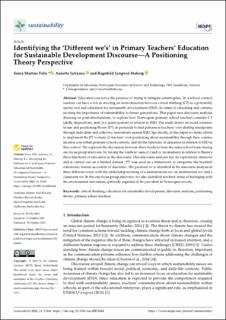| dc.contributor.author | Felix, Sonia Martins | |
| dc.contributor.author | Lykknes, Annette | |
| dc.contributor.author | Staberg, Ragnhild Lyngved | |
| dc.date.accessioned | 2023-02-09T13:31:15Z | |
| dc.date.available | 2023-02-09T13:31:15Z | |
| dc.date.created | 2022-10-18T16:52:30Z | |
| dc.date.issued | 2022 | |
| dc.identifier.issn | 2071-1050 | |
| dc.identifier.uri | https://hdl.handle.net/11250/3049766 | |
| dc.description.abstract | Education can serve the purpose of trying to mitigate catastrophes. In a school context, teachers can have a role in enacting an interconnection between critical thinking (CT) as a potentially useful tool and education for sustainable development (ESD), in terms of educating and communicating the importance of sustainability to future generations. This paper uses discourse analysis, drawing on post-structuralism, to explore how Norwegian primary school teachers consider CT (skills, dispositions, and civic participation) in relation to ESD. The study draws on social constructivism and positioning theory (PT) in particular to find patterns in teachers’ own shifting standpoints through individual and collective assertations around ESD. Specifically, in this paper we make efforts to implement the PT to study (i) teachers’ own positioning about sustainability through their communication acts within primary-school contexts, and (ii) the functions of education in relation to ESD in this context. We explored the discussion between three teachers from the same school team during one focus group interview, by tracing the teachers’ uses of I and we (as markers) in relation to Biesta’s three functions of education in the discourse. Our discourse analysis has an exploratory character and is carried out on a limited dataset. PT was used as a framework to categorize the teachers’ statements; treated as content of discourse. The pronoun we is identified in the discourse analysis in three different ways: with the underlying meaning of a humanitarian we, an institutional we, and a classroom we. In the one focus group interview, we also identified teachers’ sense of belonging with the environment and nature, generally regarded to be prevalent in Norwegian society. | en_US |
| dc.language.iso | eng | en_US |
| dc.publisher | MDPI | en_US |
| dc.rights | Navngivelse 4.0 Internasjonal | * |
| dc.rights.uri | http://creativecommons.org/licenses/by/4.0/deed.no | * |
| dc.title | Identifying the ‘Different we’s’ in Primary Teachers’ Education for Sustainable Development Discourse—A Positioning Theory Perspective | en_US |
| dc.title.alternative | Identifying the ‘Different we’s’ in Primary Teachers’ Education for Sustainable Development Discourse—A Positioning Theory Perspective | en_US |
| dc.type | Peer reviewed | en_US |
| dc.type | Journal article | en_US |
| dc.description.version | publishedVersion | en_US |
| dc.source.volume | 14 | en_US |
| dc.source.journal | Sustainability | en_US |
| dc.source.issue | 20 | en_US |
| dc.identifier.doi | 10.3390/su142013444 | |
| dc.identifier.cristin | 2062502 | |
| dc.relation.project | Norges forskningsråd: 302774 | en_US |
| cristin.ispublished | true | |
| cristin.fulltext | original | |
| cristin.qualitycode | 1 | |

